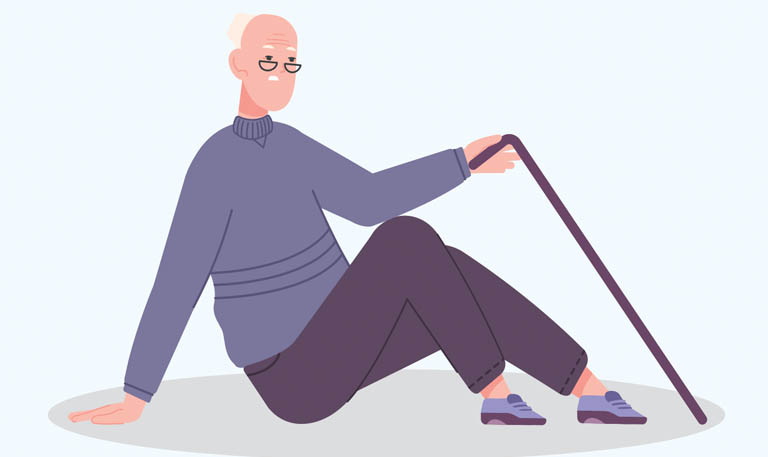Many years ago, I walked past the house of an elderly lady on my way to work. One winter morning I saw her sitting on her porch steps with a couple of people gathered around. “I fell! I fell!,” she was shouting, obviously scared and confused.
“Too bad,” I thought. “I guess that’s what happens to old people who aren’t careful.”
Now, it’s happened to me. Walking to the alley behind our house, I slipped on an icy step from our deck and fell hard on my bottom. As soon as I knew I could move my legs, I crawled back up the steps and grabbed the deck railing.
That’s where my wife found me, head down, dizzy, breathing heavily, and sweating in the 20-degree weather. “I fell,” I said, still trying to get my bearings. “I slipped and fell.”
I got into the house and sat down. I was pretty sure I hadn’t broken anything, but every joint in my body felt shaken. That was the beginning of weeks of pain and uncertainty.
We had a trip planned in a few days, and I was determined to go. With the help of lots of Tylenol and a seat cushion, I endured the six-hour flight to our destination and the car ride to our rented condo. But I was stiff and couldn’t walk far and turning over in bed was agony.
I spent most of the trip sitting in soft chairs with an ice pack. I tried to play golf a couple of times, but couldn’t swing a club, so I mostly rode around in the golf cart. One night, we went to a concert where I spent half the time leaning against a wall to ease my back.
The worst thing, though, was the fear of falling again. I thought I was in good shape for my age (79), but now I was unsteady on my legs. My balance was off. I feared walking on uneven surfaces. Every wet leaf, every muddy place in my path was a potential hazard. I went up and down stairs slowly, watching my feet and holding onto bannisters.
Eventually, the pain went away, and I regained my confidence. But it left me with a new respect for people you see shuffling along with walkers or canes for support. According to the website PubMed, more than a third of all people over 65 fall every year, and in half those cases the falls are recurrent.
Some falls are caused by unsafe environments (slippery steps), but most come from medical conditions, cognitive or vision problems, declining muscle strength, side effects of medications, or substance abuse. Regardless, the World Health Organization estimates that in the U.S., 20-30% of older people suffer moderate to severe injuries due to falls. In many cases, the falls lead to the thing most dreaded by older people—permanent disability and a loss of independence.
Falls can happen to anyone, often when they’re least expected. Being aware of that is the first step to preventing them. Taking simple precautions like watching your footing is the second. You can’t be too careful, after all.
Corwin King is a retired university professor now serving as an adjunct faculty member at Pacific Northwest University of Health Sciences in Yakima. His articles on health and other topics have appeared in The Seattle Times, Seattle Post-Intelligencer, The Christian Science Monitor, and The Mensa Bulletin. He lives in Ellensburg.


